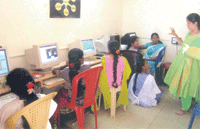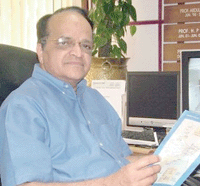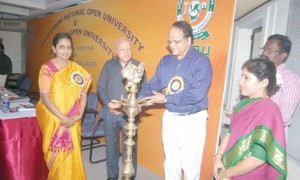The community college system as an alternative and supplementary form of education assumes significance in the context of efforts to make education, particularly the entrants into higher education and vocational education in our country, gainfully employable. Indira Gandhi National Open University has taken a big stride in this direction, with the launch of its Associate Degree Programme while framing the IGNOU Community Colleges.
 Indira Gandhi, former Prime Minister of India once said, “Education should inculcate a life-long habit of learning. And today, this is all the more necessary, because the corpus of knowledge is increasing at a tremendous pace.” Indira Gandhi National Open University (IGNOU), the institute established with the vision of the leader, just follows through the golden rule.
Indira Gandhi, former Prime Minister of India once said, “Education should inculcate a life-long habit of learning. And today, this is all the more necessary, because the corpus of knowledge is increasing at a tremendous pace.” Indira Gandhi National Open University (IGNOU), the institute established with the vision of the leader, just follows through the golden rule.
Recent Government of India efforts to enhance the Gross Enrollment Ratio in tertiary education has resulted in a number of instituitions, a thrust on vocationalisation, and increased use of technology. In order to have a diversified and multi-channel higher education framework, the experience of other countries shows that there is a need for an innovative educational alternative rooted in the community. A well tested success internationally has been the incorporation of Community Colleges as an integral part of the higher education system. The purpose of Community Colleges is to provide skill based, livelihood enhancing education and eligibility for employment to the disadvantaged and under-privileged like the urban poor, rural poor, and women. Providing appropriate skills development in collaboration with local industries thus leading to gainful employment is the major target of Community Colleges.
Another major contributon of Community Colleges has been to expand access to post secondary studies for millions of students who would otherwise not have an opportunity to participate. Even in countries like the US and Canada, where it started as peripheral to the mainstream higher education system, people’s perception have changed and the social importance of an Associate Degree through a formal mechanism has considerably increased. Approximately, 44% of all undergraduates in the US study in Community Colleges.
Looking into the size and complexity of needs among the Community Colleges, educational policies are being framed to set up a regulatory agency providing governance guidelines, rules, regulations, etc. Recognition of the courses from the universities, by granting appropriate credit transfer/equivalency in the credits is in the pipeline.
prof. V N Rajasekharan Pillai, Vice-Chancellor, IGNOU
 “The government plans to open more ‘Community Colleges’ across the country with focus on skill development during the Eleventh Plan Period, with an aim to generate skilled manpower for the labour market. Such colleges, providing an open-access admission policy, would also fulfill the mandate of the National Skill Mission and bring hopes to drop-outs, besides realising dreams of those who wish to complete higher studies. They would have provisions for vertical mobility and service as a community-based institution of higher education.
“The government plans to open more ‘Community Colleges’ across the country with focus on skill development during the Eleventh Plan Period, with an aim to generate skilled manpower for the labour market. Such colleges, providing an open-access admission policy, would also fulfill the mandate of the National Skill Mission and bring hopes to drop-outs, besides realising dreams of those who wish to complete higher studies. They would have provisions for vertical mobility and service as a community-based institution of higher education.
IGNOU would act as a facilitating agency for such colleges. The varsity proposes to offer ‘Associate Degree’ programmes to these colleges with focus on skill development. On completion of the course, one can seek a lateral entry to the third year undergraduate programme in a regular college. One can even explore different subject areas before committing to a programme. The beneficiaries, would be school drop-outs, late entrants into higher education, and working people who find entry into the formal system rigid. The students would be allowed to pursue continuing education through all meaningful formats
to reach out to formal education by framing the Associate Degree programme. IGNOU Community Colleges: The 11th Plan Prescription As we need a focused agenda to address all concerns in skill education, the government initiated the process of reform by announcing the need and probable procedure for establishing the Community Colleges in the 11th Five Year Plan. The Plan document reads like- ‘Existing 190 community colleges (largely in southern states of India, some of which offer diploma courses) will be supported for capacity building, training cost (equipment, faculty development, stipend, etc, but not for civil works, nd other capital costs). Setting up additional 210 community and eastern parts of the country will be supported on placement based funding. Funding will be based on a MoU between Community Colleges, states and Ministry of Human Resources Development.’ The Plan document again identifies and emphasises the role of IGNOU taking a lead in this alternative mode of education for the unreached community. The 11th Five Year The Community College is seen now as an innovative educational alternative rooted in the community providing skill based, livelihoodenhancing education and eligibility for employment to the disadvantaged and under-privileged like the urban poor, rural poor, tribal poor, and women. Appropriate skills development leading to gainful employment in collaboration with the local industries and the community is the major target of the Community Colleges. The success achieved by the system encourages the strengthening and consolidation of the existing colleges along with the step-wise expansion of the sytem to all the states in the country. Lack of recognition has been a major problem by those who passed out from the Community Colleges. All over the world, particularly, in the US , this problem was there in the initial development stages of the Community Collges. This was solved Why Community Colleges in India Largest youth population Only 5% of Indian labour force in the age group of 20-24 have obtained vocational skills through formal means. (Industrialised countries 60-96%) Only 2.5 million vocational training seats are available, where as 12.8 million enter the labour market every year. Largest share of new jobs likely to come from the unorganised sector which employs upto 93% of the national workforce. •
• • Sam Pitroda Chairman, national knowledge commission How do you see the Community Colleges- a peoples’ movement or a parallel system? It is neither a people’s movement nor a parallel system of education. It is just a way of restructuring our education system, so that we provide all opportunities to large number of people with the ability to migrate. I see ommunity Colleges as instruments of mobility. What is India’s expectation from the ommunity College movement? From the Indian perspective, what should be the ingredients of such measures? This is a system, which is all flexible. People who want to get in the ngineering colleges, people who wish to do well in education, this comes as an opportunity for them. If you study in Community College, you can go back and even do a Ph D programme, hich eventually allows you not to stop in the journey of education. So this encourages a lateral obility in education. Basically, in our system of education, there are too many affiliated policies. We have evolved a system over a period of time, where we have a number of affiliated colleges. But this is just not workable. In this proces , we have lost the quality of a good university. Rather, from this, we can create separate samll community colleges, and samll universities. We can create structures that are manageable. In the past, everyone wanted to be affiliated to a best university, w ether they are capable or not. Politically too, they were allowed. But by that process, good univeristies end up having too any affiliated lleges. So with the Community College system, we are just trying to make separate affiliated olleges and institutions of focus, stability, and of quality with research orientation. National Knowledge Commission (NKC ) has recommended that entrepreneurial/self-employ ent skills be promoted among students, on and off campus. How do you see IGNOU ’s step towards aunching Associate Degree programme for Community Colleges? The entire prospect has been laid out clearly in the NKC recommendations. But then now some ody has to really pay attention to the implementation. Implementation is being done at ministry level and state evel as well. With such steps like IGNOU Community Colleges, I hope, it gets proper attention ow. But the need is to engage the Indian education community, the readers of Digital earning agazine to study the NKC recommendations, go to the depth, debate, research, and articulate them. I expect, the essence of Community College is well treated with the new rogramme of IGNOU . “Instruments of Mobility”
Dr. Kalyani Anbuchelvan, Vice-Chancellor, Tamil Nadu Open University
The Tamil Nadu Open University (TNOU ) is honoured to associate itself with the world’slargest Open University, the Indira Gandhi National Open University, on the CommunityCollege initiative. The Associate Degree programme through the community colleges is thebrain-child of Prof Pillai, who always has nurtured robust academic schemes for the poor andunder developed communities. Generations to come will remember IGNOU with gratitude for this initiative, which will go a long way in strengthening, among others, the Indian literacy
this initiative, which will go a long way in strengthening, among others, the Indian literacy
level. My hearty wishes to Dr Latha Pillai, the Pro Vice-Chancellor, IGNOU , the committed
executor of this programme! Tamil Nadu remains the pioneer in the Community College initiative. The initiative was well received by the bureaucracy to the extent that the IAS officers in those initial days have suggested to confer the status of Skill Development Centres to Community Colleges. The Government of India has also sanctioned INR 10 lakh during the Tenth Plan period for the development of Community Colleges in Tamil Nadu. Unfortunately, the project could not take off due to various socio-political reasons. Today, the young Members of Parliament show great interest in Rural Skill Development. I am happy to share that the present Government at the State not only encouraged the Community College system, but also has in its last budget allocated INR 1 crore as student scholarship for those who study at the TNOU through the Community Colleges. As on date, the Tamil Nadu Open University has 124 Community Colleges, which have enrolled a little more than 40,000 students. Of this, about 70 percent of the students are employed in the relevant industries. The Tamil Nadu Open University itself has employed more than 55 students. I am confident that with the guidance of the IGNOU , the TNOU will be in a better position to translate this project into a
successful reality. the basic electives in the respective subject of study worth of 32 credits to be completed in the first two years of Associate Degree programme of the Community College. A number of existing courses of IGNOU may be appropriately combined for an Associate Degree. Firming up with voices from the community: IGNOU Community Colleges Interface meetings Taking a stride from the concepts to action, the move for setting up community colleges in all parts of the country started gaining momentum when over 250 institutions met at IGNOU on 24 April 2009, for a daylong interface meeting to decide further action-plan. Eminent social workers from NGO s, Vice Chancellors of state level open universities, UGC member Fr. Xavier Alphonse, representatives of leading organisations in the movement like Young Men’s Christian Association, etc. attended the conference. Vice Chancellor, Professor VN Rajasekhar Pillai, who presided over the conference, said that the
movement has its seed in the 11th Plan outlay of the nation, in which the Planning Commission had identified






















